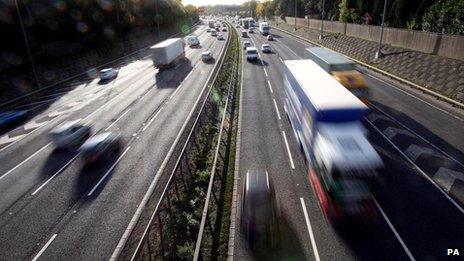Can new motorway services drive an economic recovery?
- Published
How service stations used to look, and a trip around the UK's newest motorway service area
Half-way between Heathrow and Gatwick at Junction 10 on the M25, Britain's newest service station feels like an airport food court.
When Cobham opened last year it brought lattes and burritos to a 63-mile stretch of motorway that had previously been empty.
"Until this one opened, you would struggle to find something round here," said one grateful trucker.
The government wants more "Cobhams", to give more choice to the motorist.
The Department for Transport is consulting on the relaxation of the rules governing new building projects beside major roads.
The plans include lifting the restrictions that apply to the size of the shops and the abolition of the 12-mile minimum distance between service stations.
The idea was first raised by John Major when he was prime minister.
"Every parent knows what I mean - 'next services 54 miles' when your children can't make ten. They've got to go and those rules have to go," he told the 1992 Conservative Party conference to enthusiastic applause.
Glamour vs functionality
But there has been tension between the government's view of these facilities and the vision of the private-sector operators, ever since the birth of the motorway network in the 1950s.

Motorway service stations must be open 24 hours-a-day, 365 days-a-year
Then, companies such as Blue Boar and Forte used service stations to promote the best of their brands. Watford Gap Services regularly attracted bands on tour, like the Rolling Stones and Pink Floyd.
David Lawrence, author of Food on the Move: the Extraordinary World of the Motorway Service Area, says the government saw service stations "as very utilitarian places" while the providers wanted "as much glamour as possible".
"What we got was a place that the government understood as being functional and the operators understood as being entertainment."
And so new facilities will still have to abide by strict regulations, including two hours of free parking, free toilets and all-day opening on every day of the year.
The long-standing rule that they cannot be destinations in their own right is being relaxed a little, but the Highways Agency will only support developments that have minimal impact on traffic flows.
Motorway meetings
It means there will be not be any mega-malls or bowling alleys alongside the burgers and baked potatoes.
The plans have been welcomed by the industry.
Cobham's owners - Extra MSA Group - say it could spark a new trend in corporate meetings by the motorway.
The AA suggests increased competition among petrol stations could reduce the cost of fuel, which is higher on the motorway than elsewhere.
But local authorities will still have the power to withhold planning permission which the developers of Cobham services know all about because they battled the council for 19 years to bring burritos to this stretch of the M25.
- Published11 February 2013